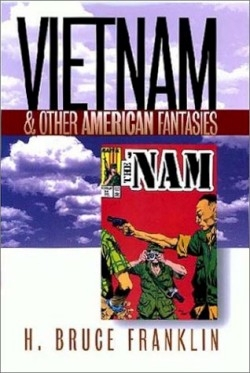Vietnam
and Other American Fantasies
Coming to terms with the Vietnam War—the war that America lost—has been a long, grueling struggle, mired by historical denial and distortion and as Franklin so formidably reveals, myths that have become entrapped in American culture. He presents a scholarly, yet personal and lucid investigation of how these myths evolved and why people depend upon them to answer the confusing questions that have become the legacy of the war.
Franklin teaches literature at Rutgers University and is the author or editor of seventeen books, including M.I.A. or Mythmaking in America, on which he relies to make a convincing case that there are not, nor have there been, POWs held in Indochina since the Americans departed in 1973. The POW/MIA issue was conceived by President Nixon and accepted by all his successors until President Clinton normalized relations, as an excuse not to live up to the treaty obligation to help rebuild Vietnam. The 2,020 American’s unaccounted for is a small number compared with the 8,100 not accounted for in Korea and the 79,000 from World War II. Unaccounted, however, does not mean imprisoned. The myth of the POW was readily accepted by the public because it allowed the war to be transformed from remorseless accounts of Vietnam peasants massacred and napalmed by American and South Vietnam troops and thousands of Americans shipped home in body bags, into visions of American POWs brutalized by Asian communists.
President Reagan, who presided during the “rambofication” of Vietnamese history, falsely claimed that there was always a communist North Vietnam intruding on a democratic-seeking South and the antiwar movement and media were responsible for the loss of the war. Franklin, himself a pre-Vietnam vet, convincingly shows the strength of the antiwar movement within the armed forces. From 1963-73, 13,518 civilians were prosecuted for draft evasion or resistance, but during 1966-73, more than 500,000 men deserted.
Franklin, fired from his tenured position at Stanford University in 1971 for criticizing American imperialism, shares his experience as a leader of the national boycott against Dow Chemical Corporation for its “perfection” of napalm. He also includes a fascinating look at the alternative press that sprang up to counter the mainstream media, which was less than up-front about the war’s progress until the Tet Offensive in 1968. By the following year, there were 500 public underground newspapers and almost twice that number in high schools, and nearly 300 similar papers put out by GIs. Numerous examples are included of how television, books, and most explicitly, movies were used to promote such false myths of drug-crazed vets being attacked by drug-crazed protestors.
America recognized Vietnam in 1973 as the one country it had always been. South Vietnam was an American invention created in 1954 at the Geneva Conference; elections formally uniting the country were to take place two years later. They were never held because America refused to honor this commitment and South Vietnam struggled to survive until its collapse in 1975. Sadly, as Franklin expounds, America is the country that was and is divided by the war.
Reviewed by
Karl Helicher
Disclosure: This article is not an endorsement, but a review. The publisher of this book provided free copies of the book to have their book reviewed by a professional reviewer. No fee was paid by the publisher for this review. Foreword Reviews only recommends books that we love. Foreword Magazine, Inc. is disclosing this in accordance with the Federal Trade Commission’s 16 CFR, Part 255.


